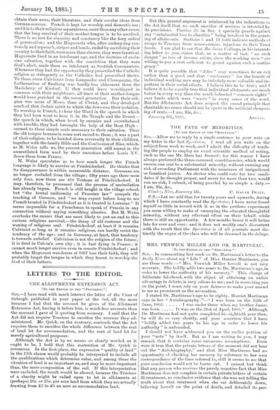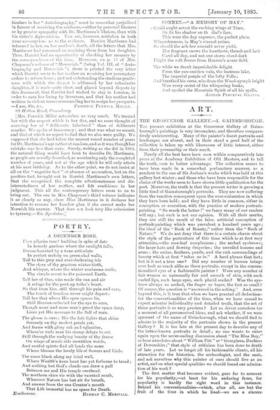MRS. FENWICK MILLER AND DR. MARTINEAU.
[To TEE EDITOR OF THE "SPEC rATost." I SIR,—In commenting last week on Dr. Martineau's letter to the Daily News about my " Life " of Miss Harriet Martineau, you use these words :—" Mrs. Fenwick Miller herself is not very accurate. She boldly adds two years to Dr. Martineau's age, in order to lower the authority of his memory." This charge of deliberate falsehood, with the object of obtaining an unfair advantage in debate, is very odious to me; and in correcting you on the point, I must rely on your fairness to make your amend to rue as prominent as the accusation.
I stated Dr. Martineau's age to be eighty. Harriet Martineau says in her " Autobiography :"—" I was born on the 12th of June, 1802 I was under three when my brother James was born It was on the 21st of April, 1805." Although Dr. Martineau had not quite completed his eightieth year then, be will do so very shortly, and your assertion that I have "boldly added two years to his age in order to lower his authority " is unfounded.
I should not have addressed you on the earlier portion of your "note" by itself. But as I am writing to you, I may remark that it contains some erroneous assumptions. Even were it true that the private letters of the moment did not bear out the "Autobiography," and that Miss Martineau had no opportunity of checking her memory by reference to her own correspondence of the time referred to, still it seems to me that your conclusion would not be borne out. I cannot but think that any person who receives the purely negative fact that Miss Martineau does not complain in certain private letters of certain ill-treatment, as conclusive evidence that she was not telling the truth about that treatment when she sat deliberately down, believing herself on the point of death, and detailed its par titulars in her " Autobiography," must be somewhat prejudiced in favour of receiving the evidence,—either by personal likeness or by greater sympathy with Dr. Martineau's Theism, than with his sister's Agnosticism. You are, however, mistaken in both your assumptions as to the evidence. Harriet Martineau had returned to her, on her mother's death, all the letters that Mrs. Martineau had preserved ou receiving them from her daughter. Thus, ITarriet had an opportunity of checking her memory by the correspondence of the time. Moreover, on p. 4:3 of Mrs. Chapman's volume of "Memorials " (being Vol. III. of "Autobiography and Memorials "), there is printed the very letter which Harriet wrote to her mother on receiving her peremptory orders to return home ; and notwithstanding the studious gentleness with which the despot is addressed by her submissive daughter, it is made quite clear, and placed beyond dispute by this document, that Harriet had wished to stay in London, in order to earn her living by literature, and that her mother had written in violent terms commanding her to resign her prospects.
—I am, Sir, &c., FLORENCE FENWIC I: MILLER. 68 Halton Road, Cononbary.
[Mrs. Fenw•ick Miller astonishes us very much. We treated her with the respect which is her due, and no more thought of accusing her of " deliberate falsehood " than of deliberate murder. We spoke of inaccuracy ; and that was what we meant, and that of which we regret to find that we also were guilty. We supposed that she had taken the nearest round number of years for Dr. Martineau's age rather at random, and so it was, thonghher mistake was less than ours. Surely, writing as she did in 1881, the natural thing would have been to describe Dr. Martineau, as people are usually described, as numbering only the completed number of years, and not at the age which he will only attain at his next birthday. As to the other point, we do not insist at all on the " negative fact " of absence of accusation, but on the positive fact, brought out in Harriet Martineau's own letters, that she recognised the complete afiectionateness and disinterestedness of her mother, and felt confidence in her judgment. This all the contemporary letters seem to us to bring out. The one in Mrs. Chapman's third volume indicates it as clearly as any, since Miss Martineau in it declares her intention to resume her London plan if she cannot make her Norwich life answer. That does not look very like submission to tyranny.—En. Spectator.]







































 Previous page
Previous page